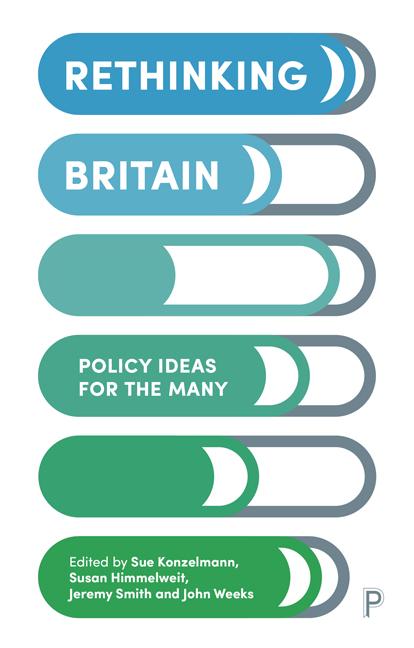Book contents
- Frontmatter
- Contents
- List of Tables and Figures
- The Contributors
- Foreword
- Introduction
- Interlude: ‘Mirror, Mirror, On the Wall – Who has the Highest Debt of All?’
- Part One Building a Full-Employment Economy: Introduction
- Part Two Public Investment – Prioritising Society Rather than Profit: Introduction
- Part Three Making Finance Work for Society: Introduction
- Part Four Genuine Social Security: Introduction
- Part Five How to provide for Social Needs: Introduction
- Conclusion
- Jargon Busters
- References and Further Reading
- Index
5 - What Should Guide Monetary Policy?
Published online by Cambridge University Press: 11 March 2021
- Frontmatter
- Contents
- List of Tables and Figures
- The Contributors
- Foreword
- Introduction
- Interlude: ‘Mirror, Mirror, On the Wall – Who has the Highest Debt of All?’
- Part One Building a Full-Employment Economy: Introduction
- Part Two Public Investment – Prioritising Society Rather than Profit: Introduction
- Part Three Making Finance Work for Society: Introduction
- Part Four Genuine Social Security: Introduction
- Part Five How to provide for Social Needs: Introduction
- Conclusion
- Jargon Busters
- References and Further Reading
- Index
Summary
What's the issue?
Two decades after the granting of independence to the Bank of England to determine its own monetary policy, the doctrine that formed the basis for this policy has been discredited by the financial crisis of 2007–10 and its aftermath. This doctrine was the ‘New Consensus on Monetary Policy’, the view that monetary policy should function by varying the interest rate at which the central bank provides funds to the money market. The New Consensus presumed that setting the central bank rate would effectively regulate the rate of inflation and the business cycle.
With quantitative easing discredited, what principles should guide the practice of UK monetary policy?
Analysis
After the global financial crisis at the end of the 2000s, inflation slumped despite the so-called extraordinary measure of quantitative easing (QE). Exchange rate shocks following the European Union (EU) referendum and internationally transferred price increases have determined UK inflation rates. Associated with price behaviour are increasing concerns about ‘secular stagnation’ and the effect on the financial stability of the central bank of purchases of long-term securities from private corporations (so-called QE). The blame for the failure of the 1990s New Consensus policy doctrine has been placed on the monetary transmission mechanism from the cutting of central bank interest rates to private lending. The absence of any economic rebound after interest rates was attributed to the ‘breakdown’ of this mechanism. No alternative doctrine or theory has emerged to guide central bank operations.
The monetary transmission mechanism is not a mechanical process. It does not ‘break down’, but alters with the changing structure of the financial markets. A structural examination of the financial markets rather than an examination of financial indicators shows why QE policy ceased to work. Development of dollar swap markets internationalised UK money markets. With the exception of the US Federal Reserve System, no central bank in a country without capital controls can use money markets as the starting point of a transmission mechanism of that central bank's monetary policy. Cross-border capital movements overwhelm Bank of England actions.
- Type
- Chapter
- Information
- Rethinking BritainPolicy Ideas for the Many, pp. 34 - 37Publisher: Bristol University PressPrint publication year: 2019



